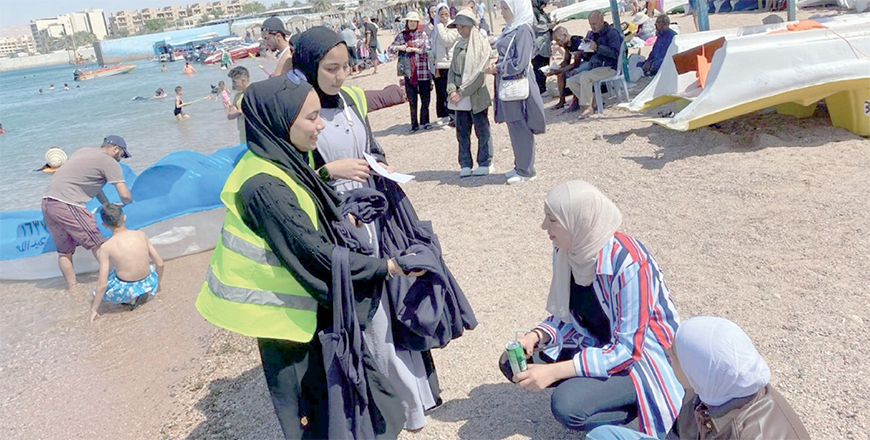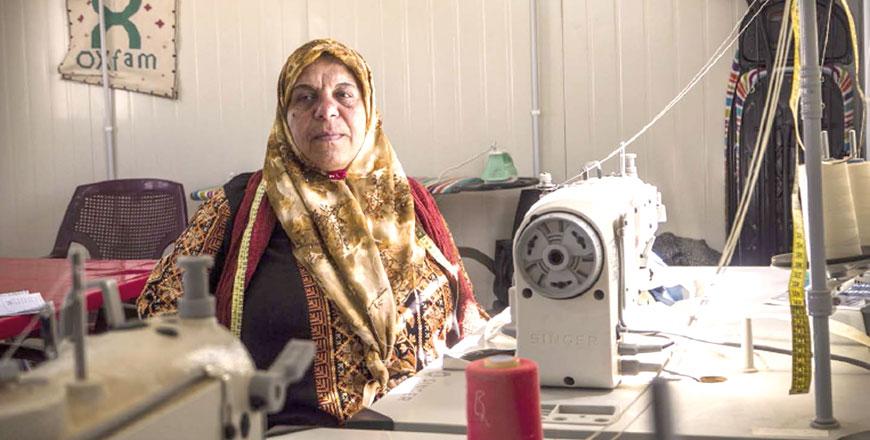You are here
Border-town factory turns women’s skills into sustainable earnings
By Camille Dupire - Jan 16,2018 - Last updated at Jan 16,2018

Syrian refugee women and Jordanian women from northern Jordan work at the Teenah factory in Irbid recently (Photo courtesy of Teenah.org)
AMMAN — A social enterprise based in the development zone in Irbid, northern Jordan, has been helping refugee and local women access sustainable work opportunities through the creation of handcrafted tote bags.
“After working with NGOs involved in the Syrian crisis, Agnes and I have been nurturing the idea of creating a project that would help refugees and underprivileged women in a sustainable way,” said Raneem Meqbel, co-founder of Teenah.
“Contrary to the common belief, we see Syrian refugee women as a great source of productivity for the Kingdom, and not just as a burden,” she explained, stressing the high level of skills these women possess in vocational activities.
Along with her co-founder Agnes Aistleitner, Meqbel has set up a bag factory in only 10 days, 25 kilometres away from the Syrian border.
“It has not been an easy process and, of course, we had been operating on a home-based approach for a while beforehand,” said Aistleitner, who recalled that they “experienced a lot of issues, with machines not working properly, fabrics being stuck in customs and shortage in funds.”
However, the team set up quite efficiently and started producing tote bags 10 days after its establishment.
“By working with underprivileged communities, we realised that refugees need more than just cash assistance and instant help. They need something more sustainable,” Meqdel told The Jordan Times over the phone, adding: “We decided to create a product that was simple and easy to make, but could also have a wide commercial outreach.”
“Since our launch in November 2017, we have been employing 11 women full time and we have also hired five women who work from home on a part-time basis,” she continued.
One of the workers, Samya, recalled how difficult life was before she was offered this work opportunity. “The circumstances we experienced because of the war made us weary and forced us to ask others for help,” she said.
However, despite the hardships she endured throughout the years, she used her previous experience and her passion for craft-making to come up with new designs for Teenah, which she said “helped her and her family financially and morally”.
She stressed the need for every woman and girl to “learn and practice skills that can provide you with a dignified life in case you and your family have lost the main provider”.
Attached to every bag produced by the women, a small black hangtag reads “Skills are everywhere. Carefully crafted by Syrian Refugee and Jordanian Women. Natural and fair. Made in Jordan.”
“Through this hangtag, we want to help communicate the story of the product’s origin and of the women who worked on it,” the two founders said, referring to the ladies working in the factory as “wonder women”.
“Our mission is not only to produce high-quality bags but mostly to create sustainable perspectives for refugee women of all ages through education and work,” the Teenah founders said.
Therefore, in addition to the work opportunities it provides for these women, Teenah also runs educational programmes with partner institutions like UNICEF, SEP Jordan and Vienna-based Globart, where women learn English and financial literacy, among other skills.
“When we ran a focus group with the women in Irbid, we realised they struggled the most with how to manage their income. This is why we decided to run this kind of partnerships, which truly help them on a daily basis,” Meqdel explained.
“We believe that learning is a lifetime choice and that constant skill enhancement is a necessity to adapt to changing circumstances,” the founders concluded, adding: “We want to help build a resilient community equipped to deal with constant changes and the technological advancements in today’s society and industries.”
Although the two founders voiced their hope to expand their project to other areas, they stressed the importance of focusing on the marginalised communities in Irbid Governorate, where population density is especially high and fewer humanitarian projects are implemented.
Related Articles
AMMAN — Aiming to encourage a positive shift towards environmentally positive practices, a recent campaign in Aqaba has focused its efforts
AMMAN — In Jordan's refugee camps, where the number of work opportunities remains largely disproportional to the number of working age resid
ZAATARI — “From the pain we were suffering, we have created something beautiful,” Fatima Sharban said about the tote bags she learned how to



















